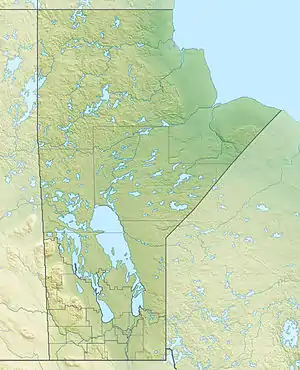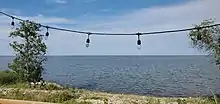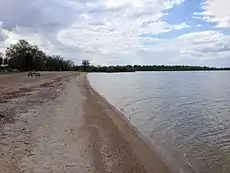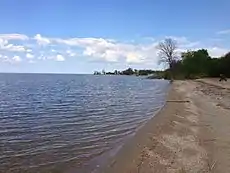Dauphin Lake
Dauphin Lake is located in western Manitoba near the city of Dauphin, Manitoba. The lake covers an area of 201 square miles (520 km2) and has a drainage basin of about 3,420 square miles (8,900 km2).[1] The Mossy River drains the lake into Lake Winnipegosis. The basin is drained by seven major streams and has a total relief of 1,900 feet (580 m). The lake is located within the territory of three rural municipalities; in descending order of area they are the Rural Municipality of Ochre River, the Rural Municipality of Dauphin, and the Rural Municipality of Mossey River.
| Dauphin Lake | |
|---|---|
 Dauphin Lake | |
-001.jpg.webp) Dauphin Lake is west of Lake Manitoba | |
| Location | Manitoba |
| Coordinates | 51°15′N 99°45′W |
| Primary outflows | Mossy River (to Lake Winnipegosis) |
| Catchment area | 8,870 km2 (3,420 sq mi) |
| Basin countries | Canada |
| Surface area | 521 km2 (201 sq mi) |
| Average depth | 2.4 m (7 ft 10 in) |
| Max. depth | 3.4 m (11 ft) |
| Water volume | 1.29 km3 (1,050,000 acre⋅ft) |
| Residence time | 3.55 years |
| Shore length1 | 190 km (120 mi) |
| Surface elevation | 260.4 m (854 ft) |
| References | [1] |
| 1 Shore length is not a well-defined measure. | |
The lake provides wonderful recreational opportunities. Fishing is popular in both winter and summer, many people camp on the lake's shores and there are many cottages.
Dauphin Lake was named after the Dauphin of France, heir to the French throne, by Francois de La Verendrye in 1739.

Hydrography
Dauphin Lake is located west of Lake Manitoba and south of Lake Winnipegosis. It receives most of its waters from the west.
Mossy River Dam
Several efforts have been made to control lake levels in the last century. In 1964 the Mossy River Dam was constructed at Terin's Landing at the outlet of the lake. The ten bay concrete stoplog structure complete with a fish ladder is operated by the Province. The summer target since 1993 has been 854.8 feet (260.54 m). The dam can restrict the outflow when conditions are dry and levels low but the river limits the outflow when the lake is high.
Regulation of the lake is difficult. Conditions can change very quickly. For example, a four-day rain in June 1947 produced an estimated peak inflow of 60,000 cubic feet per second (1,700 m3/s). At normal levels, the Mossy River can only take out about 500 cubic feet per second (14 m3/s).
See also
References
- "World Lake Database (Dauphin Lake)". Archived from the original on 2015-09-20. Retrieved 2015-01-09.
- "Natural Resources Canada-Canadian Geographical Names (Lake Dauphin)". Retrieved 2014-01-06.
- "Atlas of Canada Toporama". Retrieved 2015-01-06.
- Hind, Henry Youle (1860). Narrative of the Canadian Red River Exploring Expedition of 1857. London: Longmans.
- 1916: David Thompson's narrative of his explorations in western America, 1784–1812 (edited by J.B. Tyrell)

